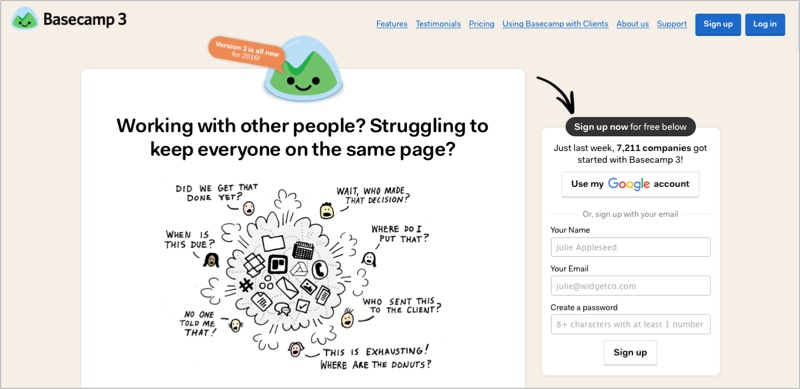

Have you ever tried to build an internal team of blog contributors in your business?
It’s hard work…
When things first kick off they usually start with a bit of momentum. You get together with the marketing team and muster up a content strategy.
And then to get things started you run a kickoff meeting with the whole office (or at least the experts you’ve earmarked to contribute).
The first few weeks start well… Employees are excited to put their face to the brand and help you generate some online buzz.
But then reality hits.
Before long the new car smell wears away and everyone realizes how HARD it is to produce high quality content.
So people start slowly disrespecting your deadlines…
“Sorry, I had a client call me last minute and I couldn’t get it done”
They know your soft spot, because clients always come first, right?
Then things start to spiral out of control. Deadline after deadline gets pushed back until finally you just stop talking to each other about it.
They know it’s awkward, you know it’s awkward… but the three tonne pink elephant in the corner of the office just keeps standing there, and no one is writing a blog post!
What you won’t admit to yourself
It’s frustrating isn’t it? You put so much effort into the content strategy, and building some momentum with your team that it HURTS to see it all fall over.
Why can’t they just follow through with what they said they would?
But you know what… The harsh reality is, it’s actually YOUR fault.
You’re the one that missed the content deadline yourself, and let them know that it was going to be ok to do the same. You’re the one that let them miss that deadline without any fight. You’re the one that failed to articulate the value of writing blog posts to your staff in the first place.
Because if they TRULY understood it’s value, they wouldn’t miss the deadline, would they?
You can hate me for it, but deep down you know it’s the truth.
So hate me… Or do something about it.
The one thing that isn’t going to motivate anyone to write for you
You may think it’s the easy way out, but there is one thing that won’t motivate any employee to write content for you… And that’s money.
Money is NOT a motivator.
I’ve seen Business Owners and Marketing Directors offer $100, $200 even up to $300 to employees to write blog posts for them.
But it still doesn’t change anything. Because if they wanted to exchange money for content, they’d become a freelancer. Not work in your business.
People are motivated by making a meaningful contribution that is aligned to their own aspirations and life values. Not by money.
If the answer isn’t money, then what is it?
I have put together a list of 13 effective ways you can motivate your team of internal blog contributors and not one of them involves a monetary benefit to the employee.
We have used each of these tactics with our premium clients to:
- Create excitement for employees to contribute to the blog
- Build unstoppable momentum for the content strategy, and achieve FASTER results
- Remove the culture of missing deadlines, and instead build a backlog of consistent blog content
Sound good?
Disclaimer: Not all of these tactics will be directly relevant to your situation, so pick the ones that make the most sense.
Let’s get into it then…
1. Involve them in topic generation
One of the most effective ways to encourage an internal blog contributor to follow through with a deadline is to involve them in the ideation phase.
Organize a time to sit down with them and talk about the type of topics they are excited to write about.
What do they want to be known for? What is the most interesting part about their role in the business?
You’ll quickly discover a WHOLE lot more about that person than you could imagine… And before long will have a short list of potential topics they would be happy to write about.
Whatever you do, resist the urge to chime in with your own opinion. As their manager or superior they will most likely seek your acceptance or guidance. But as soon as they feel like it’s your decision and not their own, the commitment becomes flimsy.
Of course, whatever they write about needs to fit within your content strategy and the overall goals of the business… But give them some room to be creative.
In this situation, I love to use the football field metaphor.
You’ve got your corner posts… These are the boundaries that they can’t go outside of.
Within that, you’ve got the goals. These are how you win, the things you want to achieve and the ideal outcome of the content strategy.
Anything within those parameters that progresses the objective of scoring more goals is free game.
At the beginning of your meeting with them, articulate the boundaries and the goals. Then let them fill the space.
2. Get them to collaborate as a team
Who says that your blog posts need to be authored by one person?
A great way to empower your employees to deliver more content is to get them working on it as a team.
It not only makes it more enjoyable for them because they are growing relationships, but it also develops mutual accountability for an outcome and a deadline.
For example, sit down with a small team of employees and go through the same topic generation process you would go through with an individual. Get them to work together on delivering the blog post by an agreed date.
What you’ll find is that naturally someone will take the lead and coordinate the effort – it will become their little project. And if the team is made up of say four people, and the blog post needs to be 2,000 words long, splitting that into four all of a sudden doesn’t feel so overwhelming.
You can use a tool such as Basecamp to coordinate these mini-projects and encourage team members to collaborate using their document sharing and to-do list functionality:

3. Align your efforts to their values and beliefs
Values and beliefs are fundamental to the way we live our lives… Both personally and in work.
They guide our thoughts, actions and opinions, and subsequently form the basis for which a group of people become friends.
How well do you understand the differing value sets your employees hold?
This one might sound a little fluffy… But it can be extremely important in the work environment. And it goes far beyond motivating employees to contribute to your blog.
If you are regularly encouraging behavior or delegating tasks that directly clash or contradict with someone’s value set and beliefs, they will be un-motivated and disengaged with your business.
However, if you can combine teams, construct projects, assign tasks and manage your employees based on the values through which they see the world… They become more willing to do whatever it takes to contribute and progress the betterment of your company.
If you know your employees well, and are in-sync with their strongest beliefs and values, then you can weave them into the way they deliver content.
It might sound high-level and hard to action, but it’s just about listening to what your staff care about.
Whilst not values-specific, Gallup’s Strengths Finder is a great tool for better understanding what makes your employees tick.

4. Draw a line to their aspirations
It’s well understood that a self-set goal is far more likely to be achieved, than one handed down by a manager.
That’s why personal goal-setting on a regular cycle is so important for the motivation and engagement of employees.
At least once a quarter you should sit down with your team, one at a time, and talk through their goals and aspirations:
- Start with the big picture, where do they want their career to be in 5 or 10 years time? What about their life in general?
- Once you know the overarching aspiration, what are the incrementally smaller milestones along that journey they can strive towards?
- And finally, what is the very next milestone along that path and what are some short-term goals they can set to feel like it had been achieved?
Once again, I know this is veering slightly from the topic of content marketing… But human behavior and effective management practices are perhaps the most important influencer over how motivated your team is to contribute blog content.
Once you understand their BIG aspirations and map out a path to get there, you can start to help them understand why contributing to your blog is an important cog in that journey.
“You told me you wanted to achieve _____ at this company. Is that right?”… Wait for their response. “Well a big part of us helping you get there, which is our priority, is to grow our online presence and support the goals and aspirations of all our employees. Content is a huge part of us all making that happen. Do you want to contribute to that journey?”
If they have not bought into the vision of your company as a whole, then you have a bigger problem than simply getting content up on your blog.
5. Tie it back to tangible business results
As I mentioned earlier in this post, people want to feel like they are making a meaningful contribution – in life, and in work.
If you can start to tie your blog activity back to meaningful business outcomes – such as leads, growth and authority – employees begin to see the direct contribution they are making to the progression of the business.
Meaningful and regular contribution to a greater vision is a core ingredient to a happy workplace.
So how do you do this?
One of the biggest problems that content marketers face is articulating and proving an ROI from their efforts.
But if you can measure the blog metrics that matter, and map out a clear customer journey from the top of your marketing funnel all the way down to the part where they start spending money, content can play a VERY measurable and meaningful role in this journey.
Track this story, tell it to your employees, and empower them to make a difference for your business.
6. Create milestones and remove the deadline stress
Instead of plucking a publishing deadline out of thin air, and telling someone to prepare a blog post before that date, plan it out like a project.
When you have that initial meeting with your internal contributor, ask them to set realistic project milestones and deadlines themselves. Don’t arbitrarily enforce them based on your own opinion. This just creates stress and anxiety in the lead up to the deadline when they don’t have anything ready.
For example, milestone one may be the post structure. Followed by key examples, points and statistics. And then finally the finished post.
Ask them questions like…
What do you think is a realistic deadline for getting the structure done for this post?
Are you happy to be accountable to that deadline?
Is there anything you can imagine would stop you from meeting that deadline?
Subconsciously they are now committing to the deadline multiple times, they know it is important.
7. Put it in the calendar
It might sound basic, but having these milestones and project deadlines in the content calendar, as well as the actual publishing date, can reinforce the importance and accountability of the whole thing.
This tactic works especially well when you have teams collaborating on content and writing posts together. Because you can create shared deadlines, and provide access to the whole team in one calendar.
People are happy to miss soft deadlines if it is just themselves they are letting down, but they are much less likely to do so if others are relying on them.
A great calendar tool for team collaboration and accountability is CoSchedule:

8. Make it a priority (seriously)
Is content ACTUALLY important to you and your business?
I mean seriously, is it?
A lot of people say it is, but they don’t really mean it. Or they run a blog because they think they’re “meant” to.
I’m not here to judge, if you don’t want to use content marketing in your mix of lead gen activities that’s fine. But don’t pretend, and certainly don’t half-ass it.
If you believe in content marketing then give it everything you’ve got. Make it a priority and show that to your employees.
Because if it’s not a priority, I mean deep down inside… If you regularly push it down your to-do list or choose other “more important” activities that pop up instead, then your employees will see right through you.
As soon as they see the underlying tone of what you really think, they will devalue its importance in their own minds as well.
That’s when deadlines go missing.
To prove content is important you need to invest time, budget and resources into it. Hire a content marketing manager, or outsource to an agency. Do something that shows everyone internally how important it is.
9. Walk the talk
This one is a doozy… And it’s the hardest one to confront for most business leaders.
If it’s ok for YOU to miss a deadline, then it’s ok for them to as well.
When’s the last time you pushed back the publication date of a blog post?
I bet you convinced yourself that it was justified in some way… “It can wait until Monday” or “You know what, that client conversation is more important right now we’ll have to put this off”.
There are an endless list of valid excuses you can make to miss a blogging deadline, but very few of them cut the mustard if you want to take this stuff seriously.
Set realistic deadlines, create un-missable milestones along the way, and DO what you say you will.
If you walk the talk, not only will you gain more respect from your employees, but they will quickly figure out how important this agenda is to the business and come along for the ride.
10. Make them the expert
The last thing you want is for it all to be about you… And this can be extremely hard for entrepreneurs who have built a business on the back of their own credentials and credibility. Especially service-based businesses.
But if you want to grow your brand’s perception, you will need to slowly shift towards a multi-author blog.
Multi-author blogs help boost the perception and credibility of your business to new visitors. It’s a vanity thing, but for some reason seeing multiple blog contributors makes us trust and respect a company more within a few seconds of landing on their website.
The cool thing is you can use this to your advantage to motivate employees to write for you.
Blogging is one of the best ways to accelerate a career or create an “expert” perception for an individual.
Take Kevan Lee from Buffer for example…

Kevan is an excellent writer with an ability to research and dominate just about any topic that gets thrown his way. But is he a social media expert?
He is now.
Ever since leading the charge for the Buffer blog, Kevan has become an industry leading expert in social media marketing. But before that he was a sports journalist.
I’m not saying this to talk down his accolades… In fact, I respect what he has done immensely. But the point is, that in this day and age anyone who puts their mind to it can become an expert in just about anything they want to. Blogging is the core ingredient to making it happen.
Use this as motivation for your ambitious employees who want to make a name for themselves and want to do it fast.
11. Create performance based incentives and reward teams
The next two tactics are as close to money incentives as I will get, and this one is a bit of a tricky one.
The idea is that you build blog contributions into your employee job descriptions and contracts, regardless of the team they are in. Then you motivate employees with performance based incentives.
So for example, to get the most out of a piece of content obviously it needs to be well promoted.
You can gamify the process with employees by rewarding them based on the amount of shares, comments, backlinks and traffic they get to a blog post.
Put up a leaderboard on a whiteboard in your office and track the key metrics for each blog post.
Then every quarter, give a reward to the highest performer.
The danger with this type of tactic is that it stirs up competition within the office. All of a sudden people may not be as willing to help promote someone else’s content, or help in the creation phase.
The best way to overcome this hurdle is to offer team-based rewards, rather than just for individuals.
Create office-wide teams that work together to create and promote a piece of content. Then reward them with a lunch or team activity.
12. Give them intangible benefits
If you are struggling to find ways to motivate your staff to contribute content, offer them intangible benefits that don’t mean you are trading time for money.
Who doesn’t want a bit of extra leave for example? Let them take a long weekend or spend some more time with their family and friends.
Things like extra holiday leave or letting them lead an initiative you know they are passionate about can work a treat.
Again, this type of motivation is going to work better if you create team-based rewards. It fosters strong relationships and encourages teamwork. But best of all, it gets things done much more efficiently.
13. Help them out with paid copywriters
Some people just aren’t natural writers… You can’t hold that against them.
The challenge becomes when they commit to writing content (despite not being confident about it), and eventually get overtaken by anxiety.
Chances are they probably won’t tell you about it until it’s too far down the road and the publishing deadline is fast approaching.
If you can empathize with their situation and help reduce that anxiety with paid copywriters, it not only gets the content written but also lands you some brownie points with your employees.
However, the key is to maintain the same tone and expert opinion of your employee, which can be quickly lost if you outsource the whole blog writing process.
One thing we do to overcome this challenge with our clients is to break down the writing process into different stages.
For example, our team will put together an overarching structure for the blog post topic that the employee has agreed to write about. Then we will get them to edit, confirm and re-structure the article as they like. This also gives them some personal ownership.
Next, you can either interview the internal expert with some pre-prepared questions about each section of the post, and get a copywriter to turn it into a blog. Or, you can get a writer to put in the research grunt work and have the internal contributor put the final touches on.
This significantly decreases their workload and removes their anxiety about the process, whilst still highlighting them as the expert on your blog.
To find good copywriters, I would recommend testing out some freelancers on UpWork:

Although this approach can be hit and miss, and you may end up spending a lot of time finding the right ones.
Alternatively you can hire us to help out!
Conclusion
Are you ready to build a growing team of internal blog contributors for your business?
It’s certainly not an easy task, but the benefits are exponential. Imagine if you were producing even 3 or 4 more high-quality pieces of content every month on your blog, and shining the light on your team as experts.
Most businesses pay content agencies good money for that type of output.
Everyone’s busy, I get that… But “busy” implies that something is important. So make content important in your business.
Empower your employees to set goals, work in teams and strive towards valuable rewards.
Believe it or not, but there are companies out there who have employees excited to be a part of the content journey.
Do you want to be one of those businesses?
Of course, there is no harm in hiring an external expert to help your employees overcome anxiety and build momentum for your content strategy.
